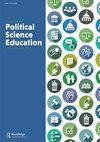解开知觉与表现:模拟中学生参与与学习的自然实验
IF 0.6
Q3 POLITICAL SCIENCE
引用次数: 0
摘要
模拟在促进主动学习和学生参与以及培养职业技能方面越来越得到认可。然而,模拟是否以及如何促进学习和参与,或者两者兼而有之,仍然是一个颇有争议的话题。许多现有的研究往往在设计上是观察性的,局限于一个学期,或者依赖于学生的自我评估来衡量效果。我们使用实验方法来证明课堂模拟对一所大型公立大学的自我评估和客观学习成绩的影响。在三年的时间里,我们用模拟来“处理”国际关系导论课程(N = 244)的一些部分,而其他“控制”部分则参与辩论和讨论。我们比较了自我评估的参与度和调查的动机,以及在同一门课程(相同的老师、材料和教科书)中的测验和考试表现。我们的研究结果表明,在控制教学模式的情况下,接受模拟的学生在迭代(每周测验)和长期(期末考试)环境中都表现出持续的学习成绩改善。研究还发现,这些改进对班上表现优异和表现不佳的学生都很有效。然而,我们惊讶地发现,学生对参与度的看法与实际课程表现之间存在脱节:自我评估的学生参与度和积极性不能很好地预测随后的学习成绩。本文章由计算机程序翻译,如有差异,请以英文原文为准。
Disentangling Perception and Performance: A Natural Experiment on Student Engagement and Learning in Simulations
Simulations are increasingly recognized for promoting active learning and student engagement and fostering career skills. Yet whether and how simulations facilitate learning, engagement, or both are still subjects of considerable debate. Many existing studies tend to be observational in design, constrained to a single semester, or reliant on student self-assessment to measure efficacy. We use an experimental approach to demonstrate the effects of classroom simulations on both self-assessment and objective academic performance at a large public university. Over the course of three years, we “treated” some sections of an Introduction to International Relations course (N = 244) with simulations while other “control” sections participated in debates and discussions. We compare self-assessed engagement and motivation from surveys, as well as performance on quizzes and exams in the same course (same instructor, materials, and textbook). Our results demonstrate that students “treated” with the simulations show sustained improvements in academic performance in both iterative (weekly quizzes) and long-term (final exam) contexts, controlling for the mode of delivery. These improvements are also found to be robust for both high and low-performing students in the class. However, we were surprised to find a disconnect between student perceptions of engagement and actual course performance: Self-assessed student engagement and motivation were poor predictors of subsequent academic performance.
求助全文
通过发布文献求助,成功后即可免费获取论文全文。
去求助
来源期刊

Journal of Political Science Education
POLITICAL SCIENCE-
CiteScore
1.80
自引率
36.40%
发文量
69
期刊介绍:
The Journal of Political Science Education is an intellectually rigorous, path-breaking, agenda-setting journal that publishes the highest quality scholarship on teaching and pedagogical issues in political science. The journal aims to represent the full range of questions, issues and approaches regarding political science education, including teaching-related issues, methods and techniques, learning/teaching activities and devices, educational assessment in political science, graduate education, and curriculum development. In particular, the journal''s Editors welcome studies that reflect the scholarship of teaching and learning, or works that would be informative and/or of practical use to the readers of the Journal of Political Science Education , and address topics in an empirical way, making use of the techniques that political scientists use in their own substantive research.
 求助内容:
求助内容: 应助结果提醒方式:
应助结果提醒方式:


